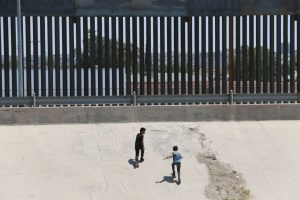By: Gabriela Fall, 2L
On June 7, 2010, 15-year-old Mexican national Sergio Adrián Hernández Güereca was fatally shot by Jesus Mesa Jr., a U.S. Border Patrol agent in a concrete culvert separating El Paso, Texas, from Ciudad Juarez, Mexico. According to court documents, Hernández and his friends were playing a game where they would cross the unmarked border, touch the fence on the U.S. side, then run back to the Mexican side. While the boys were on the El Paso side, Mesa detained one of the kids for illegally crossing the border, but Hernández managed to get away and cross back into Mexico. Hernández, while on Mexican soil, was shot in the face and killed by Mesa, who was standing on U.S. soil. Mesa claims that he shot at the unarmed teenager because the boy allegedly launched rocks at him and he feared for his life.
Following the tragic incident, Hernandez’s parents brought suit for damages alleging that Mesa’s use of excessive force violated Hernández’s Fourth Amendment and Fifth Amendment rights. The question before the Supreme Court was whether a remedy is available to a non-citizen when a U.S. officer acts stateside, but the impact of his alleged wrongdoing is suffered abroad. The legal precedent at issue derives from Bivens v. Six Unknown Federal Narcotics Agents, a 1971 case where the Supreme Court held a person could bring a lawsuit against law enforcement officers who violated the Constitution. The Justices were tasked to decide in Hernandez v. Mesa whether the Bivens decision could extend to a cross-border shooting, and if not, should Congress or the courts create a damages remedy.
Writing for a 5-4 majority, Justice Alito upheld the Fifth Circuit decision and ruled against Hernández, holding that the Court’s precedent under Bivens did not protect the petitioner. The Court held that the cross-border shooting created a new and significantly different context than the cases the Bivens decision has been applied to; therefore, it was not the role of the judiciary to expand Bivens. Rather, Justice Alito calls on the Executive and Legislative Branch to give petitioners like Hernández the right to sue.
In the dissent, Justice Ginsberg argued that the cross-border shooting should not be considered a new context under Bivens and that the majority was incorrect when it implied that foreign policy and national security would be impaired if a remedy was available to Hernández. Though Bivens remains the law of the land and has been extended twice, recently Bivens has been declined to expand to new contexts. The viability of Bivens going forward is bleak, which is especially troubling given that the death of Hernández is not an isolated incident. Justice Ginsberg writes in her dissent that one report that reviewed 800 complaints of alleged physical, verbal, or sexual abuse by Border Patrol agents between 2009 to 2012, of the 97% of the complaints that resulted in a formal decision, no action was taken. Ultimately, the decision in Hernandez signals that Bivens could be overruled entirely, significantly impacting victims who seek remedies when the government refuses and fails to discipline officers who violate their rights afforded to them under the Constitution.





